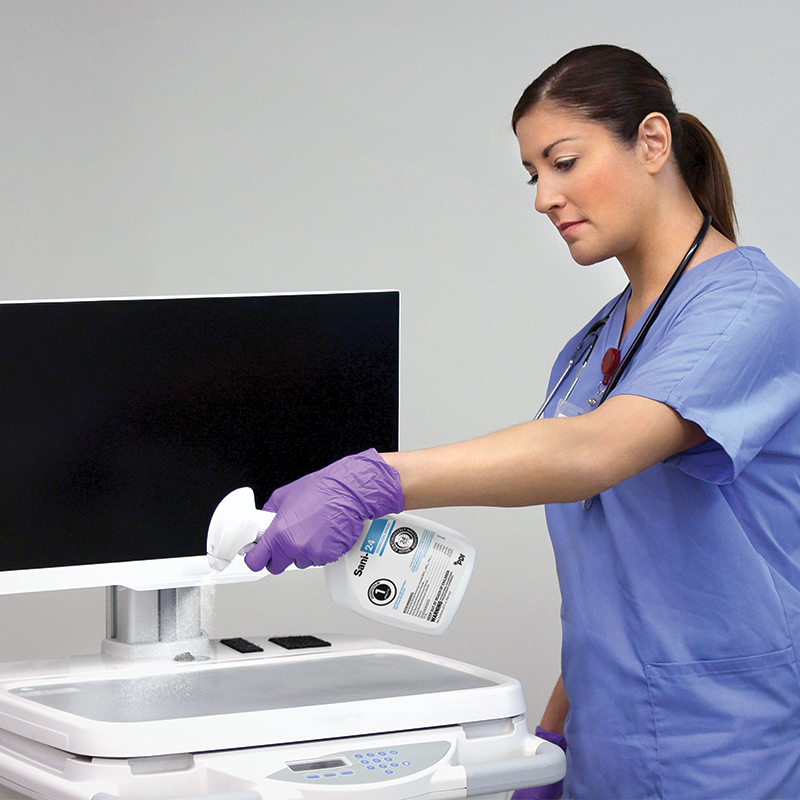Cleanliness and hygiene are fundamental aspects of maintaining good health, and cleaning and disinfection play a crucial role in this regard. In various environments, especially healthcare settings, the significance of effective cleaning and disinfection practices cannot be overstated. This article aims to explore the reasons why cleaning and disinfection matter in our health, emphasizing their impact on infection prevention, patient safety, compliance with regulations, healthcare worker safety, controlling antimicrobial resistance, and public perception and trust.
Infection Prevention
Effective cleaning and disinfection are essential for preventing the transmission of infections in various settings, particularly in healthcare facilities. Pathogens can survive on surfaces for extended periods, posing a risk of cross-contamination. Regularly cleaning and disinfecting surfaces can minimise healthcare-associated infections (HAIs), reducing the burden on patients and healthcare systems. Proper cleaning practices eliminate dirt, organic matter, and visible soiling, which can harbour microorganisms. Disinfection then kills or inactivates remaining pathogens, further reducing the risk of infection. Cleaning and disinfection protocols should be based on evidence-based guidelines and target high-touch surfaces and critical areas to ensure thoroughness.
Patient Safety
In healthcare settings, patient safety is of paramount importance. Patients are often already vulnerable due to illness or compromised immune systems, making them more susceptible to infections. Effective cleaning and disinfection practices create a safe environment by reducing the presence of harmful bacteria, viruses, and other pathogens. This helps prevent healthcare-associated infections, which can lead to prolonged hospital stays, increased morbidity and mortality, and additional financial burdens. By implementing robust cleaning and disinfection protocols, healthcare facilities can protect patients and provide a higher standard of care.
Compliance with Regulations
Healthcare facilities must adhere to strict regulations and guidelines regarding cleanliness and infection control. Organizations such as the Centers for Disease Control and Prevention (CDC) and the World Health Organization (WHO) provide comprehensive guidelines to ensure optimal cleaning and disinfection practices. Compliance with these standards is critical for maintaining accreditation, avoiding legal issues, and ensuring the provision of high-quality patient care. By following established protocols, healthcare facilities can demonstrate their commitment to infection prevention and control, protecting both patients and healthcare workers.
Healthcare Worker Safety
Healthcare workers are at the forefront of patient care, and their safety is paramount. Cleaning and disinfection practices not only protect patients but also safeguard the health and well-being of healthcare workers. By maintaining a clean environment, the risk of exposure to infectious agents is reduced, minimizing the likelihood of healthcare workers contracting or spreading infections. Proper training in cleaning techniques and the use of personal protective equipment (PPE) further enhance worker safety. Ensuring the health and safety of healthcare workers is crucial for maintaining a strong workforce, preventing absenteeism, and ensuring the delivery of uninterrupted care to patients.
Controlling Antimicrobial Resistance
The emergence and spread of antimicrobial resistance have become significant global health concerns. Overuse and misuse of antimicrobial agents have contributed to the development of drug-resistant microorganisms, rendering many antibiotics less effective or completely ineffective. Proper cleaning and disinfection practices play a vital role in controlling the spread of these pathogens. By reducing the presence of infectious agents in healthcare settings, the need for excessive use of antibiotics can be minimized. This, in turn, helps slow the development of antimicrobial resistance, preserving the efficacy of existing antimicrobial treatments and promoting more responsible use of these medications. Effective cleaning and disinfection, along with prudent antibiotic stewardship programs, are essential strategies for combating antimicrobial resistance and preserving the effectiveness of antibiotics for future generations.
Public Perception and Trust
A clean and hygienic environment instils confidence in the quality of care provided and fosters trust among patients, their families, and the community. When healthcare facilities demonstrate a commitment to cleanliness and infection control, it enhances their reputation and encourages patient satisfaction. Patients feel more comfortable seeking care in facilities that prioritize cleanliness, as it gives them reassurance that their well-being is a priority.
Moreover, public perception and trust are not limited to healthcare facilities alone. In various public spaces such as restaurants, schools, offices, and transportation systems, cleanliness and disinfection practices are essential for maintaining a healthy environment. People are more likely to frequent establishments that prioritize cleanliness, as it reflects their commitment to customer well-being. Additionally, in the wake of global health crises such as the COVID-19 pandemic, the importance of cleanliness and disinfection has been magnified. The public is more aware of the potential risks associated with inadequate cleaning practices, and organizations that prioritize cleanliness are viewed more favourably.
Conclusion
In conclusion, cleaning and disinfection are integral to maintaining health in various settings. Whether in healthcare facilities, public spaces, or our homes, these practices play a critical role in preventing infections, safeguarding patient and healthcare worker safety, complying with regulations, controlling antimicrobial resistance, and fostering public perception and trust. By prioritizing cleanliness, we contribute to healthier environments and better overall well-being.





